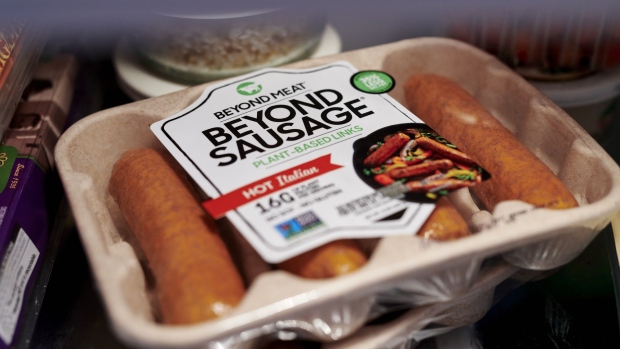Nov 11, 2021
Beyond Meat falls as slower sales seen persisting this year
, Bloomberg News

Beyond Meat Inc. fell the most in a year after its disappointing sales projection for the fourth quarter sparked concern that the company’s growth is tapering off.
The stock fell as much as 17 per cent on Thursday. That pushed the company’s year-to-date share decline to around 37 per cent.
The maker of faux beef and chicken said late Wednesday that revenue will be in a range of US$85 million to US$110 million in the final three months of the year. That was short of analysts’ estimates, marking the second time in the past month that Beyond Meat’s guidance failed to meet Wall Street’s expectations.
Chief Executive Officer Ethan Brown acknowledged “continued uncertainty for the balance of this year,” but said the company is “committed to our long-term strategy.” On a call with analysts, Brown said the guidance is intentionally conservative, given operational complexities ranging from a labor shortage, storm damage and the delta variant.

“I feel enormously confident about where we’re headed,” Brown said on the call. He added Beyond Meat wants “to guard against having to run through another set of challenges.”
GROSS MARGIN PRESSURE
The third-quarter results show that profitability is under pressure, with gross margin slipping to 21.6 per cent -- well short of the 29.3 per cent average analyst estimate. Beyond Meat attributed the weakness to factors including transportation costs, higher inventory write-offs during the pandemic and elevated warehousing costs.
Rising operational costs are going toward increasing headcount and boosting marketing, reflecting the company’s growing ambitions. But Wall Street is increasingly skeptical about growth prospects in the imitation-meat category, which is rapidly getting more competitive. Consumer interest may also be slowing following the industry’s rapid growth of recent years.
Brown downplayed those concerns on the call, noting that Beyond Meat has the highest brand recognition in the category and is the No. 1 product in retailers.
The company will also work to connect with customers, he said. A central part of that will be the company’s message that plant-based meats are better for the planet than actual meat, which contributes to environmental degradation and global warming.
The company sees its current investment as supportive of future revenue, especially via partnerships with restaurant chains.
Beyond Meat is the preferred supplier for McDonald Corp.’s McPlant patty. The company has succeeded in placing its products on a wide range of restaurant menus in recent years, as well as in a growing number of supermarkets.
But that progress appears to be fragile in the company’s latest numbers. It posted a drop of 13.9 per cent for third-quarter revenue in the U.S., with declines coming in both its retail and foodservice businesses. Beyond Meat cited “lower overall demand and operational challenges” as the key drivers behind the trend in its quarterly statement. Those losses were offset by “new product introductions” as well as significant gains in sales overseas.




